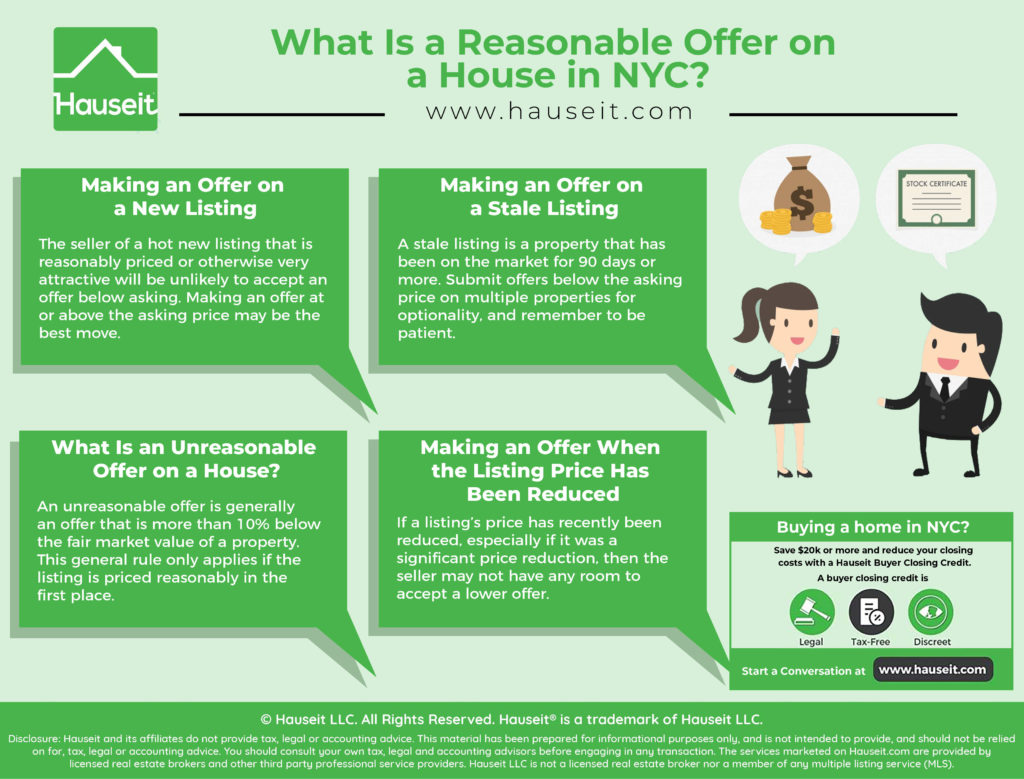What is a reasonable offer on a house? Generally speaking, offers should not be less than 10% of the asking price for a reasonably priced listing. The answer will vary based on how reasonable the listing price is.
If there’s been a significant price reduction and the house is now priced to sell, then a reasonable offer may well be the new listing price. If a listing is priced sky high vs the market, then there may be no point in making an offer at all since the seller is clearly unrealistic. We’ll discuss all these scenarios and more in the following article.
Table of Contents:

The seller of a hot new listing that is reasonably priced or otherwise very attractive will be unlikely to accept an offer below asking.
Therefore, the answer to what is a reasonable offer on a house in this scenario is the asking price or an offer above the listing price.
If you are uncomfortable with making an offer at or above the asking price, then you can wait it out and risk losing the property.
This strategy can be frustrating as the seller will most likely receive multiple offers and other bidders will have a head start if you eventually decide to make an offer.
You could also just make an offer below the asking price. However, a seller in this situation may not even bother to give you a counter offer, in which case you’ve only helped stoke the competitive flames.
That’s because the seller can credibly say to other interested parties that he or she has already received offers, but will only consider offers at or above the asking price.
Get a 2% Rebate When You Buy
Save thousands on your home purchase with a buyer agent commission rebate from Hauseit
A stale listing is a property that has been on the market for 90 days or more. You can easily tell if a listing is stale by the day count number that is prominently displayed on most real estate search websites. You can also tell if the seller is desperate by how many times he or she has reduced the price over the past several months.
The best strategy is one of patience and optionality in this scenario. You should find multiple stale listings that interest you, preferably all with recent price reductions which indicates a willingness to do a deal. You should then make below asking price offers on all of them, and stick to your guns when the sellers try to counter.
What is a reasonable offer on a house in this scenario? It all depends on how mispriced the listing is, even after any recent price reductions. If the latest listing price is in line with comparable properties for sale in the neighborhood, then you may still wish to submit an offer of up to 10% below the asking price. Anything lower may be considered rude.
For example, let’s say a listing is currently priced at $1,000,000 which is in line with neighborhood comps. It’s reasonable to try to get a better deal by coming in at $900,000 and above, even if the seller has had a recent price reduction. However, if you submit an offer of $800,000 then the seller may actually become offended and stop dealing with you at all.
Consult a seasoned buyer’s agent on this topic as it’s much more of an art than a science.
Save 2% On Your Home Purchase
Save thousands on your home purchase with a buyer agent commission rebate from Hauseit
An unreasonable offer is generally an offer that is more than 10% below the fair market value of a property. For example, if a property is priced fairly at $2,000,000 relative to comparable listings for sale in the neighborhood, then an offer below $1,800,000 would generally be considered to be unreasonable.
Keep in mind that this general rule only applies if the listing is priced reasonably in the first place.
If the listing is priced sky high, then you are free to submit an offer much less than 90% of the listing price.
For example, let’s assume the fair market value of the property in our above example was indeed $2,000,000. If the owner decided to list it for $3,000,000 then you are not bound by any rules or etiquette and are free to either not submit an offer at all or to submit an offer well below the listing price.
Pricing a property too high is an extremely flawed strategy for sellers, and is based off of logic that buyers can’t ascertain fair market value for themselves. Unfortunately for sellers who try this strategy, the most common thing that happens is for buyers to not bother inquiring, let alone make an offer on the property in the first place.
If a listing’s price has recently been reduced, especially if it was a significant price reduction, then the seller may not have any room to accept a lower offer.
A seller will be especially reluctant to consider a lower than asking price offer if a significant price reduction has just been made.
Often times a desperate seller will reduce the listing price to the absolute lowest number that he or she would accept.
This is actually a wise strategy as having a reasonable or ideally attractive listing price is the best and most effective form of advertising.
As a result, a seller truly may not have any room to negotiate after a significant price reduction.
For example, a listing in Greenwich Village came on the market for $3,250,000 in late June of 2018 and was pulled off the market after two months with no luck. It was subsequently re-listed in mid-September of the same year with an 8% price reduction to $2,995,000. A buyer attempted to make an offer at $2,900,000 shortly after it was re-listed and before the listing’s first open house.
As expected, the listing agent told the buyer’s agent that the seller had no room to negotiate given the recent, significant price decrease. Furthermore, the seller declined to provide a counter as the seller truly believed that the new listing price would do the trick and as a result wanted to hold out for at least the new asking price.
This situation presents a conundrum to the buyer as the buyer’s offer hasn’t even been countered, and the listing agents would most likely shop the buyer’s offer at the upcoming open house. Fortunately, the buyer had a great buyer’s agent who was able to get color from the listing agents that the seller would accept a full asking price offer immediately and also be able to send out a contract immediately.
Given this intelligence, the buyer made the right decision to immediately increase her offer to the full asking price. The offer was accepted and a contract was sent out shortly thereafter. Even though the buyer may face new, competing offers after the open house, the buyer has a critical head start on the contract review and due diligence process.
A Full Service Listing for 1%
Sell your home with a traditional full service listing for just one percent commission.
Disclosure: Commissions are not set by law or any Realtor® association or MLS and are fully negotiable. No representation, guarantee or warranty of any kind is made regarding the completeness or accuracy of information provided. Square footage numbers are only estimates and should be independently verified. No legal, tax, financial or accounting advice provided.






